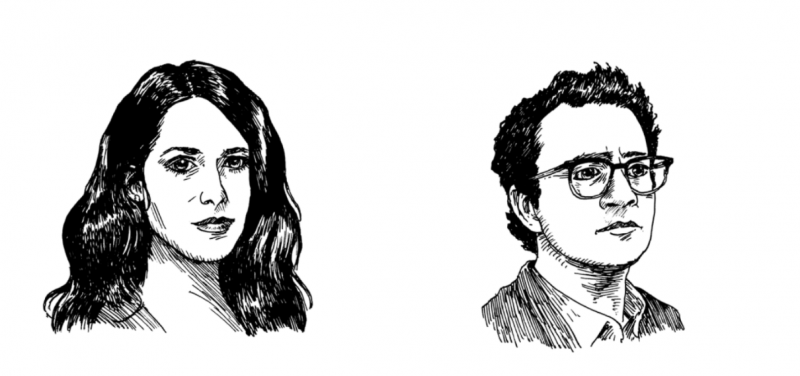Griffin Newman and Lola Kirke met in 2002. They attended the same school—St. Ann’s in Brooklyn—and summer camp, Buck’s Rock Performing and Creative Arts Camp, where Kirke says, “everyone was a fuckwad, and they all grew up and became really successful.” When they met, as preteens, Newman says Kirke was “the most confident person [he’d] ever known,” while he describes himself as a “rancid ball of self-loathing and discomfort.” Fifteen years later, they are both starring in separate half-hour Amazon shows, both of which aired new seasons earlier this year.
Lola Kirke was born in England, the daughter of Simon Kirke (drummer for Bad Company) and sister of Jemima Kirke (actress, painter), and moved to the States at age five. She currently plays the protagonist of Mozart in the Jungle, a floundering oboist learning to navigate New York’s classical-music culture. In Noah Baumbach and Greta Gerwig’s Mistress America (2015), she developed a similar, almost parallel role as a young writer discovering the dangers of adapting life into art.
Kirke is also becoming an increasingly public musician, mostly in the singer-songwriter-guitarist mode. Her songs are classic-feeling, with nice, round melodies touched by nostalgic country-and-western and filled with the spirit of ’90s alternative.
Griffin Newman has been acting in independent films and on TV (Vinyl; Search Party) for a decade or so, mostly as a character actor. (According to IMDb, his full name is Griffin Claude Beresford Dauphin Hunter Newman.) Recently, he landed the role of Arthur on The Tick, based on the ’80s comic series, which is now on its third adaptation for the small screen. The current version strikes that precarious balance between self-aware satire and earnest love of the genre’s tropes. The show is full of hammy jokes and swollen muscles, but at its center is Newman, a frail bird of an antihero, a comedic straight man who undercuts his masculinity and decisiveness with a flat, sustained deadpan.
Newman also cohosts Blank Check, a talky, bit-filled comedy podcast, with David Simms, the film critic at the The Atlantic. Its mission is to unpack the oeuvre of directors who achieve great success and then receive a metaphorical “blank check” from Hollywood, which can either clear or bounce. Subjects have included Kathryn Bigelow, Steven Spielberg, and M. Night Shyamalan, whose blank-check movies would be, respectively, Point Break, Jaws, and The Sixth Sense.
In early 2018, Kirke and Newman sat down for a casual conversation, in which they discussed their development in the industry, Gandhi, Scorsese, and ABBA.
—Ross Simonini
I. MAX FISHER TYPES
LOLA KIRKE: What was the three-and-a-half-hour play you wrote about a meta-version of our relationship called?
GRIFFIN NEWMAN: That one was called Class of...
You have reached your article limit
Sign up for a digital subscription and continue reading all new issues, plus our entire archives, for just $1.50/month.
Already a subscriber? Sign in





